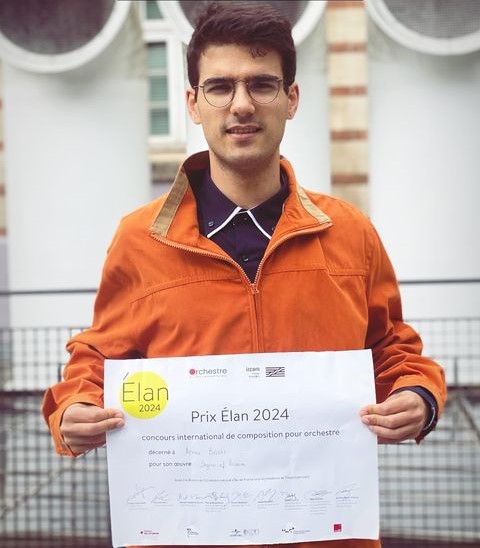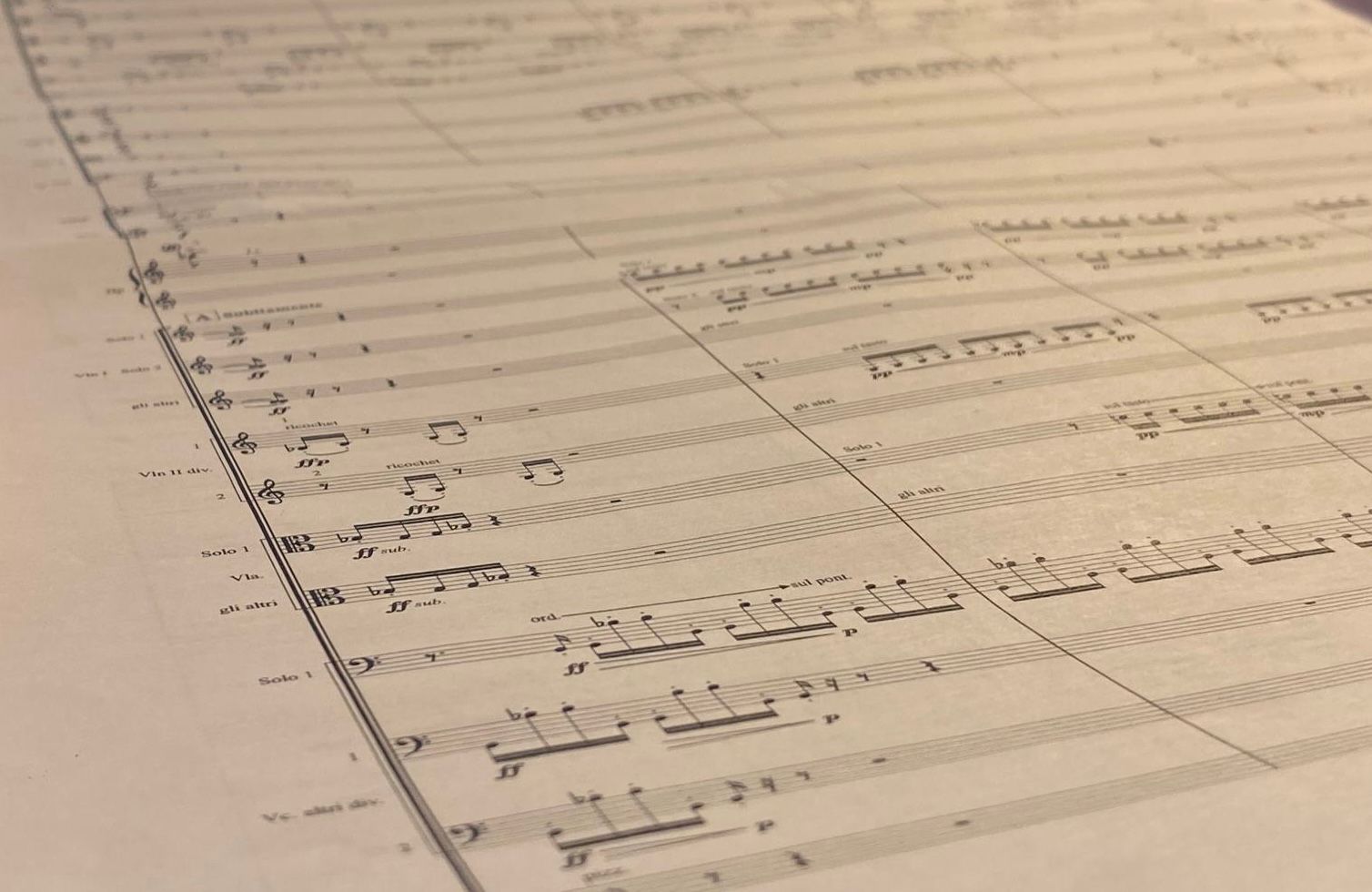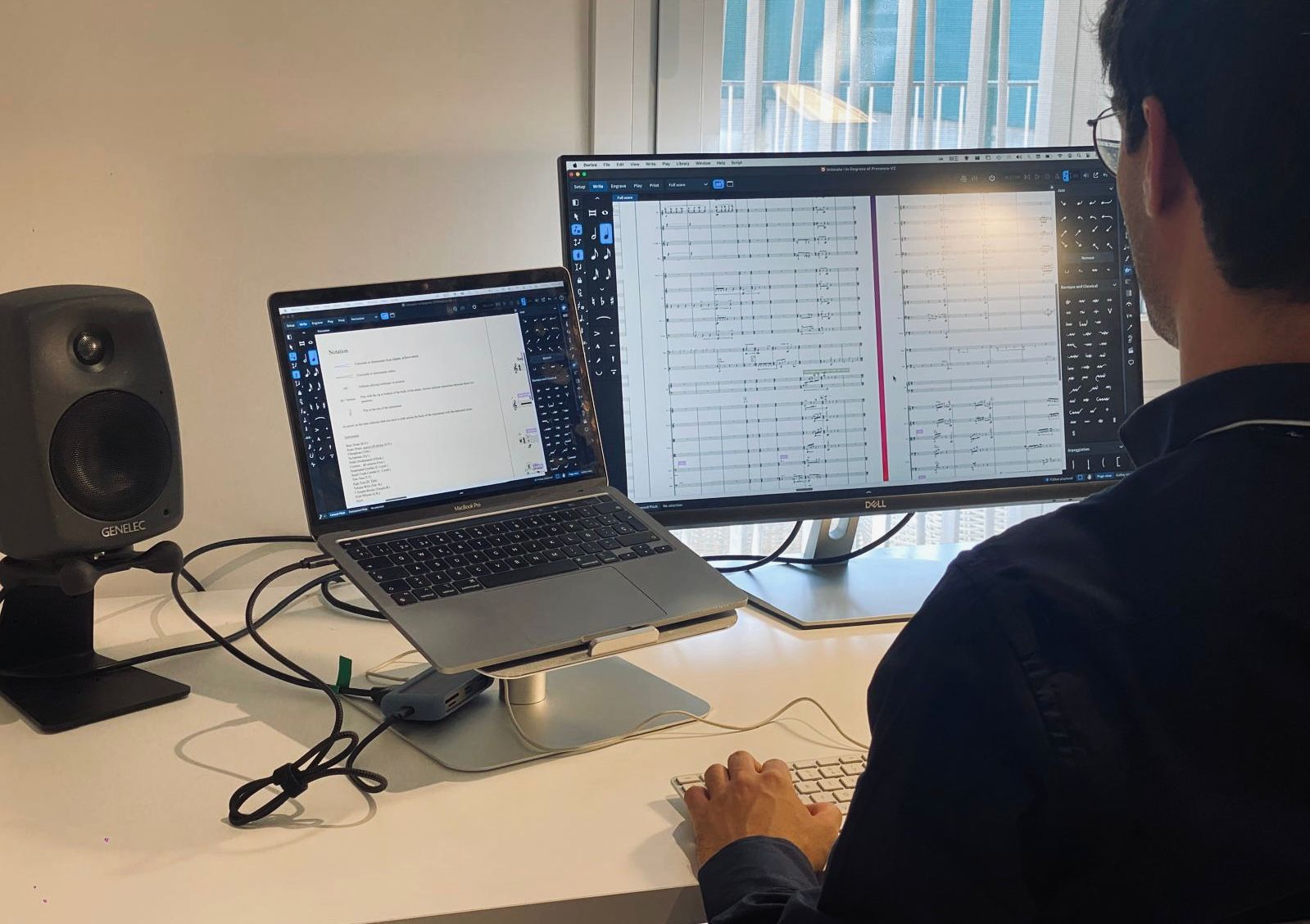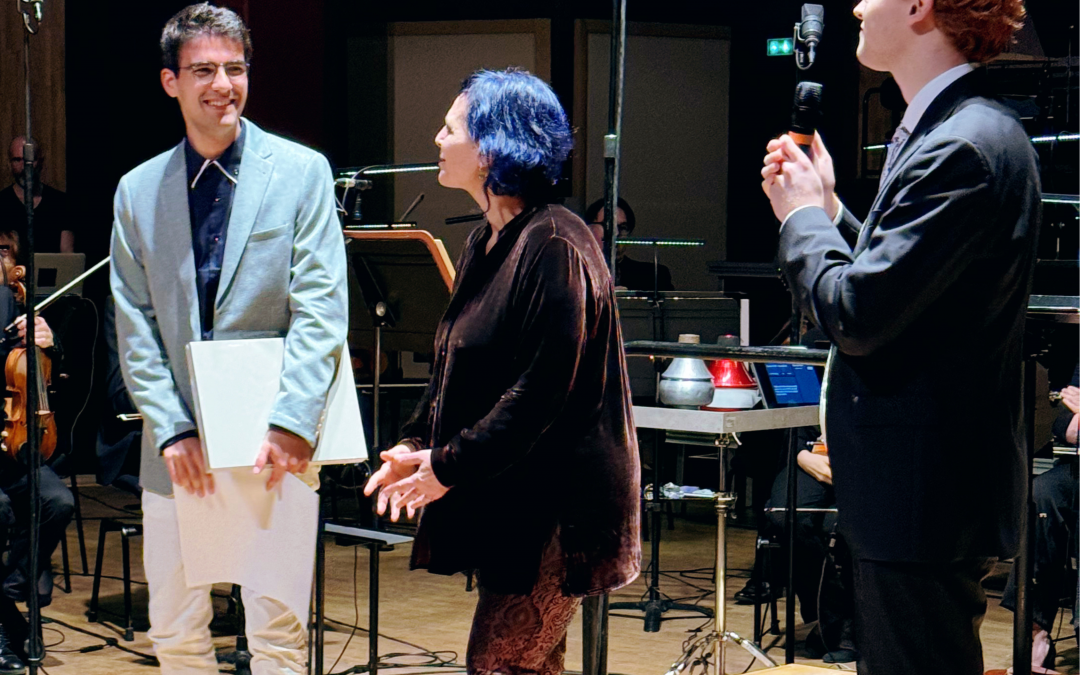In our latest interview, we had the pleasure of speaking with Arnau Brichs, a young composer based in Barcelona, whose talent has recently received significant recognition in the music world. Arnau has been awarded numerous international prizes, including the Prix Élan 2024 (France) – where he impressively won all three prizes of the competition: jury, orchestra, and public. He has also won the WCSMS Promising Young Composers Competition (USA) and the Eric Coates Prize (UK). The Prix Élan competition was introduced in 2022 by IRCAM (Institut de Recherche et Coordination Acoustique/Musique) and the Orchestre National d’Île-de-France as an initiative to promote contemporary creations and a new generation of artists. Arnau talked to us about his winning piece, Degrees of Presence, composed with Dorico music notation software, and shared insights into his creative process. Keep reading to find out more.
AN: Hi Arnau, thank you for taking the time to talk to us. Can you tell us a little bit about yourself and your background in music composition?
AB: I studied composition in the Royal Academy of Music, in London, with Rubens Askenar and Helen Grime, graduating with a first-class Bachelors in 2022. Before that, I had attended Oriol Martorell in Barcelona, a public music and secondary school where I wrote my first compositions – I also studied piano jazz with the revered Chano Dominguez in parallel. Recently, I’ve been developing software you can download for free from my web siteusing Max for Live, and using it to make electronic music, releasing it through an online label called “Pols”. I have performed solo acts in venues like the Ateneu Barcelonès, Fundació Joan Miró (Festival Lluerna), CaixaForum Barcelona (Festival Microconcerts), UTOPIA 46 or the International Music Festival of Cadaqués.
AN: Congratulations on winning the Prix Élan 2024! Can you describe the piece you composed for the competition? What inspired it, and what themes or ideas did you explore?
AB: The piece is titled Degrees of Presence and is scored for double-woodwind symphonic orchestra. The title is suggestive: it offers an exploration in our perception of sound in acoustic space. Similar to Dorico’s Live Stage templates, each movement explores a sound that is either close or far and reverberated or direct. This could be understood, for example, by comparing the direct sound of the trombones, which point the bell at the audience, versus the indirect sound of the French horns, which point toward the back wall. Each movement has a distinct character and identity, united by a common theme.

Composer Arnau Brichs, winner of the Prix Élan 2024
AN: How did Dorico assist you in the composition of your award-winning piece? Were there any specific features in Dorico that were particularly helpful?
AB:
Dorico is probably the only composition software that allows the composer to show a condensed full score while still retaining individual staves for the parts automatically.(this also includes intricate string divisis by the way).
The smart-link cue feature is also particularly useful, as are the super fast note input options and advanced engrave settings.
Orchestre National d’Île de France is a classical orchestra, with an extensive experience playing contemporary music: thus, for them, the score was not too difficult to read, as it only contained some quarter-tones and very standard extended techniques. We were asked to produce a mock-up, since the challenge was the fact that we had to write five miniature pieces of two minutes each. Dorico can also playback any quarter-tones and position sounds in the space, so the MIDI mockup was actually not far from the final result, and it helped the conductor in the early stages to learn the structure of the piece.

Excerpt of the score from the 3rd movement of ‘Degrees of Presence,’ composed with Dorico.
AN: How did you prepare for the rehearsals, and what role did Dorico play in ensuring your parts were error-free and clear?
AB: The score was sent three months in advance, and reviewed by a group of musicians of the orchestra as well as the guest composition professor Chaya Czernowin.
The feature that stands out in Dorico, as opposed to the competition, is that you don’t have to export parts in order to edit them thoroughly. Thus, parts are always linked to the general score. If you delete a bar, change a rehearsal mark or move a rallentando two bars later, all of these “global changes” will be automatically reflected in all the parts – as they should, since they affect everyone.
But, if you would like to hide a text or an octave line, say, only in the flute part, that was showing in the general score for the conductor, you can also do that. So it allows great flexibility of part edition without messing up the parts when you make changes to the general. This is commonly misunderstood, and it’s thus the source of most of the technical problems that people encounter in rehearsals, because orchestral parts usually are very tricky to get right. With this linking feature, Dorico is surely the only program that gets rid of any inconsistencies that you might encounter in the part making process, and eases one to ever have to think of these kind of problems again.

Composer Arnau Brichs using Dorico.
AN: What advice would you give to other young composers who are preparing for similar competitions?
AB: For this particular competition, it is important to showcase your best work. Apply with a piece that you consider is your best one. You can adapt it even if it’s not for orchestra. In general, competitions tend to look at musicality and originality: it’s crucial to be true to oneself, and to avoid falling in the trap of using trendy ideas just for the sake of “fitting in”. Ultimately, the point of creating music is to express yourself, not to simply echo what the community is doing – despite the fact that you will always be influenced by other music no matter what. To negotiate these aspects of creation is actually very important.
AN: What are your next steps after winning the Prix Élan? Do you have any upcoming projects you’re excited about?
AB: As a result of the Élan Prize, Degrees of Presence will be published by Durand-Universal Music, and, in this upcoming year I will be working on a joined commission by the Orchestre National d’île de France and IRCAM, where I will be in residency to create a piece for solo instrument, orchestra and electronics. I cannot wait to get started writing more music, and to write move in my musical journey further!
AN: Sounds great! Many thanks for talking to us, Arnau, and wishing you best of luck in your future projects.

